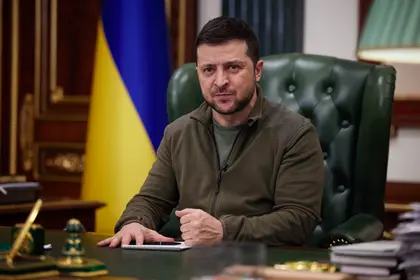President Volodymyr Zelensky commented on Ukraine’s counteroffensive indicating that the country is transitioning to defense as winter sets in.
In an AP News interview, Zelensky said the war has entered a new phase.
JOIN US ON TELEGRAM
Follow our coverage of the war on the @Kyivpost_official.
“Winter as a whole is a new phase of war. I’d say that a winter war takes place not only on the front line but inside cities, too,” said Zelensky in a comment that likely referenced the expected Russian attacks on energy infrastructure across Ukraine.
The answer followed his recent meeting with the military, where he highlighted Ukraine’s defensive efforts – such as mines and air defense systems – ahead of potential Russian attacks in a Telegram update after the meeting.
In the AP News interview, he also expressed concerns over waning global support for Ukraine as the conflict between Israel and Hamas continued to capture the headlines, which could impact Ukraine’s much-needed Western support to counter Russia’s invasion.
“We already can see the consequences of global society switching (its attention) because of the tragedy in the Middle East. And this is a fact. Only the blind could not recognize this.
“Attention equals help. No attention will mean no help. We fight for every bit of attention,” he said.
The interview was given in Kharkiv, Ukraine’s second biggest city, as Zelensky visited the eastern region amidst growing fear of Russia’s renewed offensive. During the trip, he also visited front-line positions and praised troops deployed around Kupyansk, a Ukrainian stronghold in the region.

Now It’s Time to Pull Together – Surely?
Ukraine recaptured Kupyansk from Russian control in late September 2022 in a surprise counteroffensive, but the situation has remained largely static since then.
Ukraine’s summer counteroffensive this year also yielded far less satisfactory results, according to General Valery Zaluzhny, Ukraine’s top commander, where the initial plan was to reach Crimea within four months.
He also said the war is entering a “stalemate” unless a technological breakthrough could be achieved by either side.
A myriad of factors have prevented Ukraine from achieving its initial goals, including Moscow’s heavily fortified positions and extensive minefields in occupied territories, as well as the Kremlin’s general neglect of human losses, as noted by Zaluzhny in his interview with The Economist in early November.
As Ukraine’s counteroffensive appeared to have lost its momentum, Russia has stepped up its offensive near Avdiivka, a Ukrainian stronghold in the Donetsk region, and made slow yet incremental gains – albeit at an enormous cost.
Russia’s renewed Avdiivka offensive also came ahead of Russia’s presidential election in March 2024, where its symbolic victory could bolster support for Russian President Vladimir Putin ahead of the elections.
While a potential Russian capture of Avdiivka is largely symbolic, the offensive also signified Russia’s capabilities to carry out offensive operations despite Western sanctions.
It was also reported that Russia was able to increase its 2024 budget by 25 percent, lending to further doubts on the effectiveness of Western sanctions.
Serhii Nayev, the commander of the joint forces of the Armed Forces of Ukraine (AFU), recently said the war could spread beyond the eastern and southern areas if Russia continues to escalate weapon production and military technology through alliances with its partners.
Analysts have also speculated that Russia could launch a general mobilization campaign after the election, which could severely threaten Ukraine due to the asymmetrical nature of the Russian invasion.
You can also highlight the text and press Ctrl + Enter










